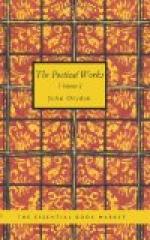As if some angel had
been sent
To lengthen out his government,
And to foretell as many years again,
As he had number’d in his happy
reign,
So cheerfully he took the doom
Of his departing breath;
Nor shrunk nor stepp’d aside for
death;
But with unalter’d pace kept on,
Providing for events to come,
When he resign’d the throne.
Still he maintain’d his kingly state;
And grew familiar with his fate.
Kind, good, and gracious to the last,
On all he loved before his dying beams
he cast:
Oh, truly good, and truly great,
For glorious as he rose, benignly so he
set!
All that on earth he held most dear,
He recommended to his care,
To whom both Heaven,
The right had given
And his own love bequeathed supreme command:
He took and press’d that ever loyal
hand
Which could in peace secure his reign,
Which could in wars his power maintain,
That hand on which no plighted vows were
ever vain.
Well for so great a trust he chose
A prince who never disobey’d:
Not when the most severe commands were
laid;
Nor want, nor exile with his duty weigh’d:
A prince on whom, if Heaven its eyes could
close,
The welfare of the world it safely might
repose.
VIII.
That king[92] who lived to God’s
own heart,
Yet less serenely died than he:
Charles left behind no harsh decree
For schoolmen with laborious art
To salve from cruelty:
Those for whom love could no excuses frame,
He graciously forgot to name.
Thus far my Muse, though rudely, has design’d
Some faint resemblance of his godlike
mind:
But neither pen nor pencil can express
The parting brothers’ tenderness:
Though that’s a term too mean and
low;
The blest above a kinder word may know.
But what they did, and what they said,
The monarch who triumphant went,
The militant who staid,
Like painters, when their heightening
arts are spent,
I cast into a shade.
That all-forgiving king,
The type of Him above,
That inexhausted spring
Of clemency and love;
Himself to his next self accused,
And asked that pardon—which
he ne’er refused:
For faults not his, for guilt and crimes
Of godless men, and of rebellious times:
For an hard exile, kindly meant,
When his ungrateful country sent
Their best Camillus into banishment:
And forced their sovereign’s act—they
could not his consent.
Oh, how much rather had that injured chief
Repeated all his sufferings past,
Than hear a pardon begg’d at last,
Which, given, could give the dying no
relief!
He bent, he sunk beneath his grief:
His dauntless heart would fain have held
From weeping, but his eyes rebell’d.
Perhaps the godlike hero in his breast
Disdain’d, or was ashamed to show,
So weak, so womanish a woe,
Which yet the brother and the friend so
plenteously confess’d.




